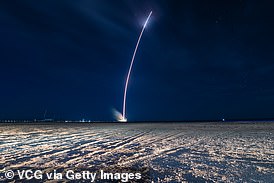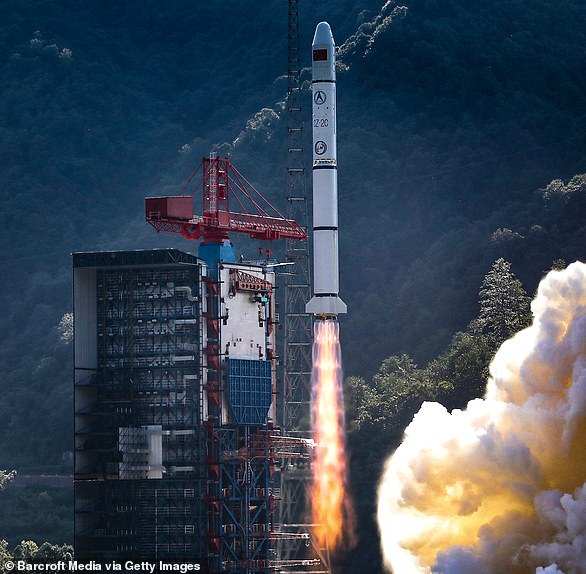More On: China
In Mao's China, people were watched even when they talked in their sleep
China could have up to six more 'illegal police stations' in the US and hundreds all around the world
There Has Been a Sharp Rise in Time Parity
Biden says that US troops will protect Taiwan, but the White House takes back what he said
Hunter Biden says he is poor when he tries to cut child support for his 4-year-old daughter
The US intelligence community is sending a unanimous warning about the growing risk that climate change is posing to national security and global stability, a chilling report revealed on Thursday.
All 18 US intelligence agencies signed off on the 27-page report, released in a declassified version by the Office of the Director of National Intelligence after President Joe Biden ordered the government to undergo a climate assessment in January.
It comes just over a week before Biden jets off to Glasgow for the 2021 United Nations Climate Change Conference.
The report illustrates how growing carbon emissions could shift geopolitical power and exacerbate existing conflicts as well as allow new ones to emerge.
'We assess that climate change will increasingly exacerbate risks to U.S. national security interests as the physical impacts increase and geopolitical tensions mount about how to respond to the challenge,' it says.
At the same time the Pentagon warned that climate disruption to fisheries could spark conflict over food resources.
And unpredictable rainfall might increase conflict over access to water, exacerbating tensions over rivesrs that cross national boundaries, such as the Nile and the Mekong.

Earlier this week reports emerged that China secretly tested two nuclear-capable hypersonic missiles that orbited the globe before returning to Earth.
The system would be able to overcome US anti-ballistic missile defense systems that are based in Alaska and set up to shoot down projectiles coming over the North Pole - the Chinese system would be able to strike the US from the south.
Under Biden the intel community was also caught by surprise earlier this year, when the rapid collapse of the Afghan government to the Taliban led to a rushed and chaotic exit for the US military.
Thursday's report is the first-ever assessment of its kind and looks into how growing carbon emissions could shift geopolitical power and exacerbate existing conflicts as well as allow new ones to emerge.

Areas like the Arctic and parts of Asia, where transboundary tensions over water already exist, would become all the more hostile as water insecurity grows.
The report identifies several areas at high risk. One is Pakistan, which relies on glacier-fed rivers in India as a significant water source. Land and social disputes among others have already built up historically poor relations between the two countries.
In the fight against climate change, US intelligence services warn that competition for geoengineering solutions could move geopolitical power away from the US.China, for example, is one of two countries that will "play significant roles in deciding the trajectory of temperature rise," according to the report.
In comparison to the European Union and the United States, both China and India are increasing their already large carbon emissions.
China has already stated its intention to achieve net-zero carbon emissions by 2060, but President Xi Jinping has yet to lay out a detailed plan to achieve this goal.
At a virtual climate summit hosted by Biden in April, Xi pledged to work toward phasing out coal.
But China is also in a 'strong position to compete' in the future of innovation in the face of climate change, the report notes.
Its control over key mineral exports necessary for renewable energy technology and low production standards would likely strengthen China's position as one of the world's largest economies.
'China is able to process these at reduced cost mainly because of its lower environmental standards, lower labor costs, and inexpensive power,' it states.
The US intel community also shares concerns that China will exploit the shifting geographical terrain in its quest for dominance.
They highlight the Artic region, which is becoming more accessible for new trade routes as temperatures rise and ice melts, and therefore new territory to be claimed.
'Military activity is likely to increase as Arctic and non-Arctic states seek to protect their investments, exploit new maritime routes, and gain strategic advantages over rivals,' the report states.
'The increased presence of China and other non-Arctic states very likely will amplify concerns among Arctic states as they perceive a challenge to their respective security and economic interests.'
The United Kingdom, France, Japan, South Korea, and India have all announced Arctic plans, prompting Russian officials to frequently emphasize "that non-Arctic countries do not have a military role in the region," according to the report.The report released on Thursday identified 11 impoverished countries that will be most vulnerable to harsh weather and rising temperatures, with 'poor governance, limited infrastructure, widespread corruption, and a lack of physical access' obstructing humanitarian help.
Guatemala, Honduras, Nicaragua, Colombia, Haiti, North Korea, Iraq, Afghanistan, Pakistan, India, and Myanmar are among the countries on the list.
'Intensifying and more frequent heat waves and droughts will create water supply volatility and probably strain their electric utility operations, while growing economies and populations will increase electricity demands to handle rising temperatures,' the assessment says.
Countries like Russia and those in the Middle East that rely heavily on fossil fuel exports will likely continue to resist calls to change because 'they fear the economic, political and geopolitical costs of doing so,' the report predicts.
Its worries and estimates were based on the intelligence community's assessment as well as the Intergovernmental Panel on Climate Change and the US National Climate Assessment's "wide consensus of scientific studies, modeling, and forecasts."'We are aware of, but do not rely on, the small minority of scientific viewpoints on climate change, ranging from those who believe it is nonexistent to those who believe it is a near-term existential threat to humanity,' it continues.




















